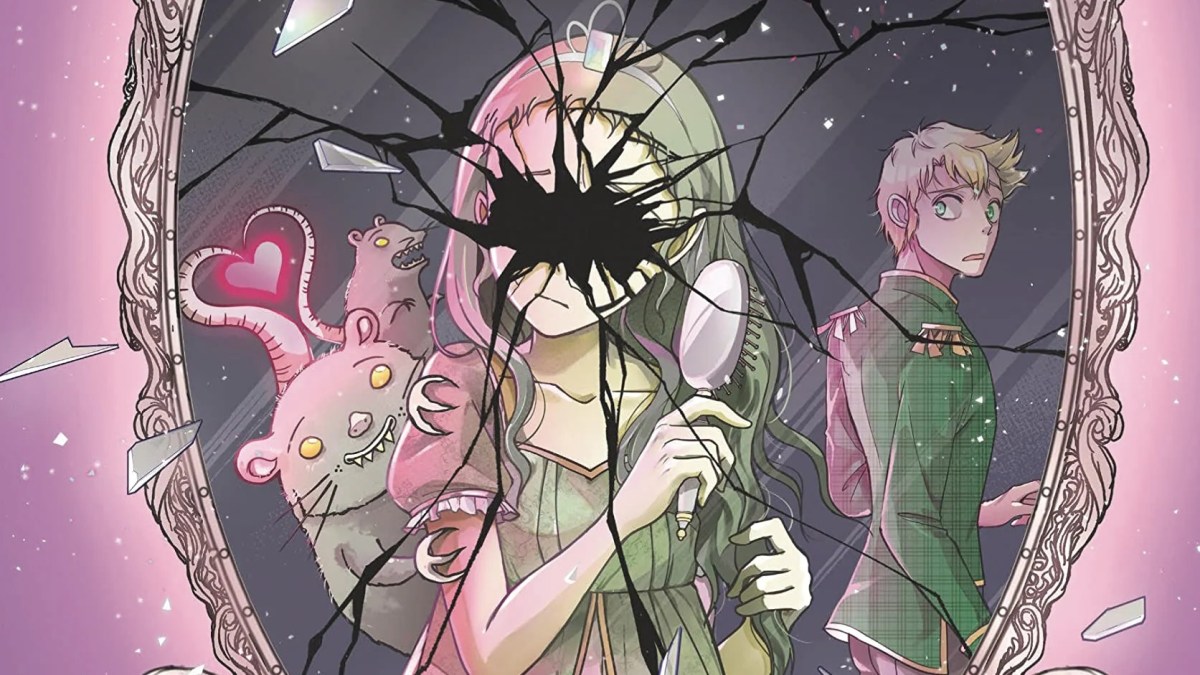Cursed Princess Club Creator LambCat on Twisting Fairy Tale Tropes
In WEBTOON Unscrolled’s newest print offering, creator LambCat challenges the expectations for fairy tale storytelling and inspires readers to reflect on their own self-care.

This article is brought to you by Wattpad WEBTOON Book Group.
When Cursed Princess Club Volume 1 opens, readers are launched into what feels like a fairly standard fairy tale kingdom, with three sibling princesses preparing to meet their prince charmings. But LambCat quickly turns the story on its head. Gwen, the youngest princess, doesn’t look like your standard fairy tale hero. Instead, people who don’t know her keep mistaking her for a witch due to her green complexion and somewhat threatening animal companions. Gwen soon discovers that in the woods near the palace, the Cursed Princess Club holds their meetings. Here princesses (and princes!) who have inconvenient and awful curses, but can’t break them, gather together to be who they are, no judgment.
While some of the princesses (and princes!) celebrate themselves without reservation, it’s harder for Gwen, who isn’t cursed—at least, as far as she knows—and other members of the club to really accept who they are. Gwen has always been surrounded by a loving family who consider her beautiful because of who she is. So when Gwen discovers that some people—including her fiance—find her ugly, she struggles with her self image. With the help of the Cursed Princess Club, she finds a way to move forward without trying to be someone, or something, that she’s not. In the first two volumes of the graphic novel series, readers get a good look at both Gwen’s story and the hilarious surrounding cast members’. LambCat’s madcap pacing keeps the story light, even in the face of heavy themes, giving these first two volumes a sense of feel-good, satisfying storytelling—with enough unresolved plot threads that readers will be eager to get their hands on the next volume! Den of Geek chatted with LambCat about the series, and what she has planned for the future.
This started as a webcomic on WEBTOON, so a lot of the content came to readers first digitally—, and now, it’s in print. How does it feel to hold the finished book in your hands?
Surreal is the only way to put it… I’ll never be able to repay everyone at WEBTOON Unscrolled and Wattpad WEBTOON Studios (Eunice Baik, Bobbie Chase, Taylor Grant, and too many other wonderful, talented people to list) for the opportunities this little story has received.
Cursed Princess Club takes back old fairy tales about cursed princesses (and princes) and posits the idea that they’re fine just the way they are—no fixing required! Where did the idea for the series first come from?
I stumbled upon a comic contest for WEBTOON in 2018, and I had never really made a story before, so I figured the first step would be to brainstorm as many ideas as I could without judgment. I think some of these ideas consisted of: an outcast/delinquent cheerleading club, another idea of a girl who makes friends with a bunch of monsters in a haunted house in a forest, and one of a fairy tale dating reality show. And somehow, after a few iterations, they gradually morphed and merged into the idea of the Cursed Princess Club.
I think ultimately, it came from a question I wanted to explore: What about all the people in fairy tales whose curses didn’t get healed fully or don’t have cures? Because in real life, there are lots of illnesses or conditions that never fully heal for many people, and some that don’t have known remedies, as doctors continue to try to understand them. How would that apply to the world of fairy tales? And following that analogy, what other parallels can we draw to real-life experiences?
As readers are launched into Cursed Princess Club, they meet the four siblings of the Pastel Kingdom: Maria, Loretta, Jamie, and Gwen. Our hero is the sweet, kind, cheerful Gwen—who also is the odd one out in terms of looks: her green hair, wrinkled face, and sharp teeth have everyone confusing her with a witch. How did you create her initial character design and color pallet?
When envisioning Gwen, I knew I wanted her to have a lot of green (which would cause her to be confused for witches, goblins, etc.), but on the flip side, to have a green that could sit well with the other cute, friendly pastel colors of her siblings/kingdom. Along those same lines, I knew I wanted a design that could toe the line between scary to outsiders, but still be naturally adorable to those who come to know her. I think this all seemed way too daunting to me, so I put off her design until it was time to actually draw the panel where she finally appears in the webcomic. But luckily, somehow, I liked what I drew in the first pass, and that became her design!
Sparklingly beautiful Prince Jamie and Gwen are both sixteen; are they twins? Does this come into play later on in the story?
That’s a great observation and question! And it’s one that I’m afraid I can’t answer without betraying spoilers in the story! Haha.
The King of the Pastel Kingdom is a doting father—to his daughters. But he seems uninterested in Jamie, despite Jamie’s kind heart and refined culinary career. Everyone loves Jamie! Will we ever find out why the king is so much less protective of Jamie, who is seemingly the heir to the Pastel Kingdom?
You’re totally right in picking up on that as well! Similar to the previous question, this is a tiny clue that—though it is never directly discussed or pointed out—eventually does correlate to a reason later revealed as to why the Pastel King doesn’t perhaps find Jamie as special as everyone else does.
You wrap in so many princess and fairy tale tropes into the story, including talking to birds and eating poisoned apples. You also use them gleefully against their origins, such as the birds blocking spitballs and the prince being the one who needs a “wake” to be freed from a sleeping curse. How did you choose what elements to include? What Easter Eggs should readers be watching for?
Thank you! I feel like I could have packed in a lot more, especially when there are so many brilliant stories and media out there that are also in the game of flipping fairy tale tropes on their head. Towards the first half of the story, it’ll mostly be references to fairy tales / classic stories tucked away in silly places, like graffitied under tables, in titles of books, costumes, dream sequences, etc. But as the story goes on, I guess you could say the story references start to reflect something about certain characters and their personal journeys.
In Volume 2 of the print series, we meet the Princels, a group of self-doubting princes who think that girls just won’t look at them because princesses have standards that are too high, and they lock themselves away from the world, bitterly trolling and insulting whoever they can. This is an obvious poking-fun at a modern phenomenon. Can you talk about what made you decide to bring them into the story?
Yeah. Aside from the silly wordplay, I added the Princels because the concept of a person hating the way they look is pretty much exactly how you could describe the protagonist, Gwen, as well, and I wanted this story to be an exploration of many variations on this overarching theme of shame and self-hatred, and the various ways one’s outlook, upbringing, or support group can affect or change that.I was pretty nervous to debut them in the webcomic, because I know it’s a topic that is justifiably contentious and triggering, and the end goal was not to do that, nor was it to minimize anyone’s particular actions or punch down on anyone. And I’m very grateful that the readers of this story were extremely open to that and the way the Princels have continued to develop over the story.
Given some of the gender-flipping in the tropes, are we going to see more LGBTQ content than what has appeared so far?
I apologize for answering so many questions in a similar way, but your observations are spot-on, and the answer is yes—though I can’t say any more for spoilers. The story starts out focusing on these very stereotypical, heterocentric, fairy tale romantic arrangements, but like many other things in this story, things change beyond face value in many different ways.
What are your plans for the story? How many print volumes do you think Gwen’s full arc will take?
I’m currently on the final 10 episodes of the Cursed Princess Club series on WEBTOON but had to take a brief break to also wrap up preparations for the third volume of the graphic novel version, which hits shelves January 2, 2024. We have five volumes planned right now.
There is so much focus in the series about the importance—and constant work—of self-love, and of caring for yourself as much as others. What do you hope your readers will see in that underlying theme?
I’m terrible at answering this question, but I guess I sort of envisioned this story for people who, like me, need some silly comedy to pad some deeper explorations about self-love and shame that I wouldn’t really feel like consuming on my own. So I guess if anyone like that sees something in this story that unlocks some consideration or compassion for themselves or people around them, I couldn’t be happier.
BONUS QUESTION! What is your favorite fairy tale?
Oh! Hm… I’m really biased with this answer, but when I was little, I spent a lot of time at the local library, and I remember I was obsessed with this picture book of The Three Little Pigs that came with a CD that not only read some variation on the story out loud, but had accompanying jazz trio music. And I thought it was the coolest thing I had ever seen or heard in my entire life. So for purely nostalgic reasons, it’s the Three Little Pigs for me, haha.
Cursed Princess Club, Volumes 1 & 2 by LambCat are out now in hardcover and paperback.
